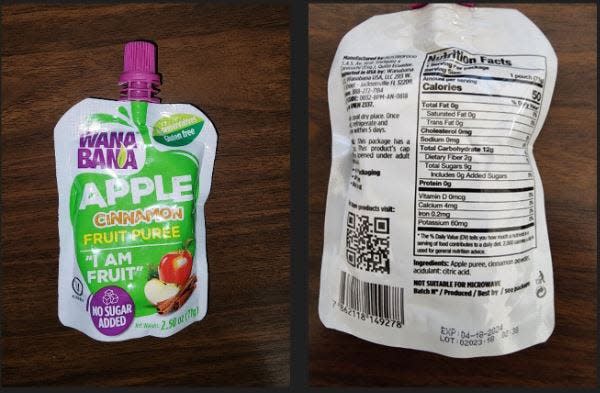Family of WNC kids with possible lead poisoning linked to WanaBana pouches files lawsuit

In October, the U.S. Food and Drug Administration warned parents to stay away from WanaBana apple cinnamon fruit puree pouches after a Madison County child's lead poisoning case ignited a national investigation.
Now, the parents of two of the four Western North Carolina children who claim their children were exposed to toxic lead poisoning have hired a firm to file a lawsuit against the manufacturer.
In a copy of the complaint obtained by The News-Record & Sentinel, plaintiffs Nicole Peterson and Thomas Duong, a married couple who live in Hickory, said their two minor children were among the four children who were exposed to toxic lead poisoning.
Motley Rice, the Mount Pleasant, South Carolina-based litigation firm that filed the lawsuit against WanaBana apple cinnamon fruit puree pouches. The complaint also lists WanaBana, WanaBana USA, Dollar Tree Stores and 10 other corporations, listed as "JOHN DOE CORPORATIONS 1-10."
Peterson and Duong's two minor children are listed as "L.D. 1" and L.D. 2" in the complaint, which reads that the children consumed the defendants' products from March 2023 to August 2023, when the couple's older child, "L.D. 1" was approximately 3 years old, and when "L.D. 2" was approximately 1 year old.
"As a result of their respective ingestion of Defendants’ Products, L.D.1 and L.D.2 have suffered catastrophic, life-long injuries including lead poisoning," the complaint reads.
Nick Hennen is the senior media specialist with Motley Rice.
"Because these pouches were still on shelves as recently as December ... I’m afraid they may still be in fridges and pantries — and parents and caregivers need to know. The effects of lead poisoning are devastating," Hennen told The News-Record & Sentinel.
"You know how it is. I have kids — if they like something, you buy a bunch and put it away. They might not have seen it on the news."
"This presents an urgent need for awareness to inform consumers of the potential dangers that are still sitting in pantries and refrigerators," Hennen said.
Madison County Health Director Tammy Cody told The News-Record & Sentinel the NCDHHS initiated its investigation in response to a case in Madison County.
On Oct. 28, the Food and Drug Administration announced the WanaBana pouches may contain elevated levels of lead after a joint investigation by the North Carolina Department of Health and Human Services, local health departments, the North Carolina Department of Agriculture and Consumer Services and the Food and Drug Administration, the FDA release said.
In the release, the FDA said it was recently made aware of a developing investigation by the NCDHHS and the N.C. Department of Agriculture regarding four children in Western North Carolina counties who had elevated blood lead levels, indicating potential acute lead toxicity.
Cody said the other three cases were seen in children from Catawba and Cleveland Counties.
As for the Madison County child's case, Cody said the Madison County Health Department had been working with the family since August, including monitoring the elevated lead levels.
"Once two normal levels are reached, our services are no longer needed," Cody said.
Cody shared with The News-Record & Sentinel the county's updated lead prevention policy and best clinical practices document Oct. 30, in which Brittany Byers, Madison County Health Department's lead nurse, shared some major points for providers, nurses and lead staff
According to Byers, all levels above 3.5 are considered abnormal and will need a follow-up.
"All elevated levels (above 3.5) will need a diagnostic (venous draw) to confirm elevation, although they will accept another capillary if necessary. Confirmation must occur within 12 months of the initial elevated lead screening (although the sooner the better)," she said in the document.
South Carolina cases
Hennen stressed that the lead poisoning issue is not specific to North Carolina, as the South Carolina Department of Health and Environmental Control announced its ongoing investigation on critical safety issue on Jan. 8.
In that release, the Department of Health and Environmental Control said it has been working closely with health care providers and the families of three children who had consumed these products and had blood lead levels test above the reference value identified by the CDC.
More: Acute lead toxicity in 4 WNC kids FDA issues warning: fruit puree linked to ‘potential acute lead toxicity’ in 4 WNC kids
More than 20,000 South Carolina food retailers have been notified of this safety crisis recall by the South Carolina Department of Health and Environmental Control’s Rapid Response team, requesting they remove the products from their store shelves, the state Department of Health and Environmental Control said in the release.
To report a complaint or adverse event (illness or serious allergic reaction), you can:
Call an FDA Consumer Complaint Coordinator if you wish to speak directly to a person about your problem.
Complete an electronic Voluntary MedWatch form online.
Complete a paper Voluntary MedWatch form that can be mailed to FDA.
Visit www.fda.gov/fcic for additional consumer and industry assistance.
NCDHHS recommends consumers dispose of the WanaBana brand apple cinnamon puree products immediately, and discuss blood lead testing with their medical providers if there is a concern about their child.
For more information and resources on child lead poisoning, visit ehs.dph.ncdhhs.gov/hhccehb/cehu.
Johnny Casey has covered Madison County for The Citizen Times and The News-Record & Sentinel for three years. He earned a first-place award in beat news reporting in the 2023 North Carolina Press Association awards. He can be reached at 828-210-6074 or jcasey@newsrecordandsentinel.com.
This article originally appeared on Asheville Citizen Times: Lawsuit: WNC kids developed lead poisoning linked to WanaBana pouches
